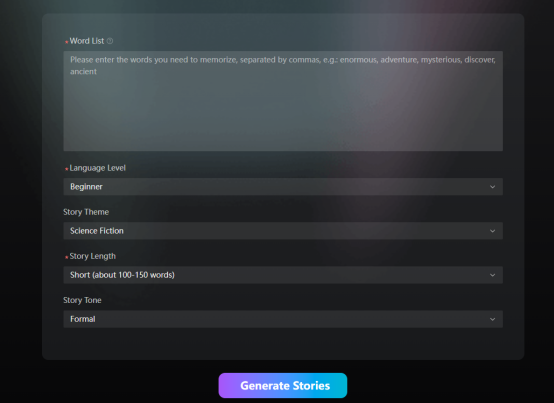Why is Vocabulary So Important in Language Learning?

When learning a foreign language like English, many students spend hours studying textbooks, doing grammar exercises, and occasionally watching programs in the target language. However, many people don't realize that in the process of learning a foreign language, vocabulary accumulation is equally important as language learning, and even more important. In this article, we will delve deeper into the topic of vocabulary and explore why vocabulary is so important in reading, and how it helps students achieve their language learning goals and easily tell engaging stories.

So, how should we improve our vocabulary? I recommend you try using XXAI's Vocabulary Memory Tool.
Vocabulary is the Foundation of Language
Simply put, vocabulary is important because it is the foundation of all language. It is the basic component for us to express thoughts, share information, understand others, and develop interpersonal relationships. Even if we barely understand a language and have no knowledge of grammar, we can still communicate. If you're still not convinced, think about children before they attempt complex language structures—they say single words like "duck," "ball," and "teddy bear," and usually manage to express what they want. Similarly, like students learning English as a second language, once their language abilities develop, their communication skills improve greatly. But the key point is that they can still communicate with vocabulary alone.
A Rich Vocabulary Helps Develop Other Language Skills
Having a richer vocabulary in the target language helps improve the four language skills: listening, speaking, reading, and writing. As Paul Nation points out in his paper on vocabulary learning: "Vocabulary is not an end in itself. A rich vocabulary makes skills like listening, speaking, reading, and writing easier to master."
Reading
For both native and non-native speakers, vocabulary may be the most important factor in reading comprehension. For example, if you sit down to read a book but don't recognize the vocabulary used in it, you'll have difficulty understanding the meaning of the text. You may end up looking up words in a dictionary, guessing word meanings from context, or simply giving up and finding something else to read. This can be disappointing, frustrating, and even destroy your confidence. This connection between vocabulary and second language acquisition has been the subject of extensive research for many years.
Listening
We see similar evidence for language learners' listening skills, for obvious reasons. Clearly, if you've never seen or heard a particular word in a second language, it will be much more difficult to recognize and decode its pronunciation and then extract its meaning. If you're an advanced language learner, you may be able to understand the word's meaning through context or by connecting it to other words in the same word family, but this can be difficult.
Speaking
If you're a native speaker, you may have had the experience of having a word on the tip of your tongue but not being able to recall it—a frustrating situation that often interrupts conversation. The same is true for second language learners who have never learned a particular word. If they don't know (or can't remember) the word, they can't fully express themselves.
Therefore, vocabulary is widely recognized as the most critical factor in determining whether someone can speak a foreign language.
Writing
If you have a richer vocabulary, you'll find writing expression much easier. You'll have more words to choose from and be more precise when expressing ideas, feelings, events, or opinions. In any language, the more vocabulary you master, the stronger your expressive ability.
Vocabulary is a Stepping Stone to Improving Language Fluency
In short, the more vocabulary you master, the easier it is to improve your language skills. First, with this knowledge, you can access more learning materials designed for both native and non-native speakers. It also helps you understand these words from context, naturally expanding your vocabulary and improving your language skills without spending time looking up dictionaries or asking others. Additionally, the more vocabulary you master, the better you can understand the meaning of new words by breaking them down into morphemes (smaller components).
How to Use Vocabulary to Tell Stories?
To tell a good story, you first need to understand what storytelling is. Storytelling is an interactive art that uses language and action to present story elements and images while stimulating the audience's imagination. XXAI's Vocabulary Memory Tool helps you turn boring vocabulary lists into engaging stories in seconds.
1. Storytelling is Interactive
Storytelling is a two-way interaction between the storyteller and one or more listeners. The audience's reactions influence the telling of the story. In fact, storytelling arises from the interaction, cooperation, and coordination between the storyteller and the audience. Particularly noteworthy is that storytelling does not artificially create a barrier between the speaker and the audience. This is one of the differences between storytelling and theatrical forms that use the "fourth wall." Different cultures and contexts have different expectations for the specific roles of storytellers and story listeners—for example, who speaks and when—thus producing different forms of interaction. The interactive nature of storytelling partly explains its immediacy and impact. Good storytelling can directly and closely connect the storyteller and the audience.
2. Storytelling Uses Language
Storytelling requires the use of language, whether spoken or sign language, such as American Sign Language. The use of language distinguishes storytelling from most forms of dance and mime.
3. Storytelling Uses Vocalization, Body Movements, and/or Gestures
These actions are parts of spoken or body language beyond words. Their use distinguishes storytelling from writing and text-based computer interaction. Not all non-verbal behaviors must be present in storytelling. For example, some storytellers use a lot of body movements, while others use few or none at all.
4. Storytelling is Telling a Story
Storytelling always involves the presentation of a story. Many other art forms also present stories, but storytelling combines the story with the other four elements. Each culture has its own definition of a story. What is considered a story in one context may not be considered a story in another. For example, some situations require improvisation and lighthearted digressions; others require nearly exact recitation of a respected text. Art forms such as poetry recitation and stand-up comedy sometimes present stories and sometimes don't. Since they usually include the other four elements, they can be considered forms of storytelling as long as they present stories.
5. Storytelling Stimulates the Audience's Active Imagination
In storytelling, the audience imagines the story content. On the other hand, in most traditional theater or typical narrative films, the audience enjoys an illusion as if they are actually witnessing the characters or events described in the story. The storyteller's role is to actively construct vivid, multi-sensory images, actions, characters, and events in the mind—the "reality" of the story. This construction is based on the storyteller's performance and the audience's own past experiences, beliefs, and understanding. The complete story happens in the audience's mind, and the audience is a unique individual. Therefore, the audience also becomes a co-creator of the story experience.
XXAI's Word Memory Storytelling Tool takes advantage of this. Users simply input the words they want to memorize, and our AI word memory story generator immediately creates a coherent story that seamlessly integrates these vocabulary words, providing a revolutionary memory method based on "situated cognition," making memorization easy and fun.
From casual chats at the dinner table to religious rituals, from impromptu telling at work to performances for thousands of paying audiences, storytelling scenarios are diverse. Some storytelling occasions require a relaxed and casual approach, while others are very formal. Some storytelling occasions require specific themes, attitudes, and artistic techniques. There are many different cultures on Earth, each with its rich traditions, customs, and storytelling opportunities. This may place high demands on your own vocabulary. So to tell a good story, a rich vocabulary is essential.
Conclusion
Vocabulary is clearly very important for language learning because it is the foundation of all other language skills, can be a stepping stone to high-level language use, can help students reach fluency faster, and can allow you to easily tell a good story.
Welcome to try XXAI's Word Memory Story Generator for free!
Check out other effective learning strategy resources provided by XXAI: